
Journal Menu
► ▼ Journal Menu-
- Veterinary Sciences Home
- Aims & Scope
- Editorial Board
- Reviewer Board
- Topical Advisory Panel
- Instructions for Authors
- Special Issues
- Topics
- Sections & Collections
- Article Processing Charge
- Indexing & Archiving
- Editor’s Choice Articles
- Most Cited & Viewed
- Journal Statistics
- Journal History
- Journal Awards
- Conferences
- Editorial Office
Journal Browser
► ▼ Journal BrowserNeed Help?
Announcements
20 June 2023
Veterinary Sciences | Highly Viewed Papers in 2021 in the Section “Veterinary Education, Veterinary Communication and Animal Behavior”

The “Veterinary Education, Veterinary Communication and Animal Behavior” Section of Veterinary Sciences (ISSN: 2306-7381) publishes articles concerning the practical skills and abilities of veterinarians and the observation and understanding of animal behavior, amongst other topics.
Since our journal is open access, you have free and unlimited access to all published articles. We welcome you to read our most highly viewed papers published in 2021, which are listed below:
1. “Motivations of Human Helping Behavior towards Dogs”
by Serenella d’Ingeo, Gabriele Ferlisi, Michele Minunno, Giovanni L. Palmisano, Gianluca Ventriglia, Marcello Siniscalchi and Angelo Quaranta
Vet. Sci. 2022, 9(3), 145; https://doi.org/10.3390/vetsci9030145.
Available online: https://www.mdpi.com/2306-7381/9/3/145.
2. “What Would You Do? Types of Ethical Challenging Situations Depicted in Vignettes Published in the Veterinary Literature from 1990 to 2020”
by Anne Quain, Michael P. Ward and Siobhan Mullan
Vet. Sci. 2022, 9(1), 2; https://doi.org/10.3390/vetsci9010002.
Available online: https://doi.org/10.3390/vetsci9010002.
3. “Association between Dog Owner Demographics and Decision to Seek Veterinary Care”
by Rachel M. Park, Margaret E. Gruen and Kenneth Royal
Vet. Sci. 2021, 8(1), 7; https://doi.org/10.3390/vetsci8010007.
Available online: https://www.mdpi.com/2306-7381/8/1/7.
4. “Impact of Obesity on Quality of Life and Owner’s Perception of Weight Loss Programs in Cats”
by Rachel Hanford and Deborah E. Linder
Vet. Sci. 2021, 8(2), 32; https://doi.org/10.3390/vetsci8020032.
Available online: https://www.mdpi.com/2306-7381/8/2/32.
5. “Pet Owners’ Perceptions of COVID-19, Zoonotic Disease, and Veterinary Medicine: The Impact of Demographic Characteristics”
by Lauren Powell, Tyler M. Lavender, Chelsea L. Reinhard and Brittany Watson
Vet. Sci. 2022, 9(5), 195; https://doi.org/10.3390/vetsci9050195.
Available online: https://www.mdpi.com/2306-7381/9/5/195.
by Katie Waine, Constance White, Rachel S. Dean, Chris Hudson, Jonathan N. Huxley and Marnie L. Brennan
Vet. Sci. 2021, 8(4), 62; https://doi.org/10.3390/vetsci8040062.
Available online: https://www.mdpi.com/2306-7381/8/4/62.
20 June 2023
Veterinary Sciences | Highly Viewed Papers in 2021 in the Section “Nutritional and Metabolic Diseases in Veterinary Medicine”

The “Nutritional and Metabolic Diseases in Veterinary Medicine” Section of Veterinary Sciences (ISSN: 2306-7381) aims to publish articles on animal nutrition, veterinary clinical nutrition, animal feeding management, animal energy metabolism, nutritional supplementation for animals’ diets, nutrients metabolic disorders, etc.
As all of the articles published in our journal are open access, you have free and unlimited access to the full text. We welcome you to read our most highly viewed papers published in 2021, which are listed below:
1. “Pituitary Pars Intermedia Dysfunction (PPID) in Horses”
by Naomi C. Kirkwood, Kristopher J. Hughes and Allison J. Stewart
Vet. Sci. 2022, 9(10), 556; https://doi.org/10.3390/vetsci9100556.
Available online: https://www.mdpi.com/2306-7381/9/10/556.
2. “The Hygienic Status of Different Forage Types for Horses—A Retrospective Study on Influencing Factors and Associations with Anamnestic Reports”
by Sandra Intemann, Bernd Reckels, Dana Schubert, Petra Wolf, Josef Kamphues and Christian Visscher
Vet. Sci. 2022, 9(5), 226; https://doi.org/10.3390/vetsci9050226.
Available online: https://www.mdpi.com/2306-7381/9/5/226.
3. “Chronic Kidney Disease and Dietary Supplementation: Effects on Inflammation and Oxidative Stress”
by Elisa Martello, Francesca Perondi, Natascia Bruni, Donal Bisanzio, Giorgia Meineri and Ilaria Lippi
Vet. Sci. 2021, 8(11), 277; https://doi.org/10.3390/vetsci8110277.
Available online: https://www.mdpi.com/2306-7381/8/11/277.
4. “Surrogate Indexes of Insulin Resistance in Dairy Goats: Transitional Variation in Subclinical Hyperketonemia”
by Siqi Liu, Yezi Kong, Jing Wen, Yan Huang, Yaoquan Liu, Xiaoyan Zhu, Baoyu Zhao, Binyun Cao and Jianguo Wang
Vet. Sci. 2021, 8(6), 102; https://doi.org/10.3390/vetsci8060102.
Available online: https://www.mdpi.com/2306-7381/8/6/102.
5. “A Complex Competitive Exclusion Culture Reduces Campylobacter jejuni Colonization in Broiler Chickens at Slaughter Age In Vivo”
by Vanessa Szott, Benjamin Reichelt, Anika Friese and Uwe Roesler
Vet. Sci. 2022, 9(4), 181; https://doi.org/10.3390/vetsci9040181.
Available online: https://www.mdpi.com/2306-7381/9/4/181.
6. “Effect of Graded Levels of Fenugreek (Trigonella foenum-graecum L.) Seeds on the Growth Performance, Hematological Parameters, and Intestinal Histomorphology of Broiler Chickens”
by Deependra Paneru, Guillermo Tellez-Isaias, Nicholas Romano, Gautami Lohakare, Walter G. Bottje and Jayant Lohakare
Vet. Sci. 2022, 9(5), 207; https://doi.org/10.3390/vetsci9050207.
Available online: https://www.mdpi.com/2306-7381/9/5/207.
20 June 2023
Veterinary Sciences | Highly Viewed Papers in 2022 in the Section “Anatomy, Histology and Pathology”

The “Anatomy, Histology and Pathology” Section aims to publish articles on veterinary anatomy, veterinary histology, veterinary physiology, veterinary pathology, veterinary neuroanatomy and neurophysiology, veterinary forensic sciences, etc.
As all of the articles published in our journal are of an open access format, you have free and unlimited access to their full text. We welcome you to read our most highly viewed papers published in 2022, listed below:
1. “Clinical Guidelines for the Use of Antipruritic Drugs in the Control of the Most Frequent Pruritic Skin Diseases in Dogs”
by Vincent Bruet, Marion Mosca, Amaury Briand, Patrick Bourdeau, Didier Pin, Noëlle Cochet-Faivre and Marie-Christine Cadiergues
Vet. Sci. 2022, 9(4), 149; https://doi.org/10.3390/vetsci9040149.
Available online: https://www.mdpi.com/2306-7381/9/4/149.
2. “Isotretinoin Treatment for Autosomal Recessive Congenital Ichthyosis in a Golden Retriever”
by Ana Petak, Ivan-Conrado Šoštarić-Zuckermann, Marko Hohšteter and Nikša Lemo
Vet. Sci. 2022, 9(3), 97; https://doi.org/10.3390/vetsci9030097.
Available online: https://www.mdpi.com/2306-7381/9/3/97.
3. “A Review of Recent Developments in Veterinary Otology”
by Richard Harvey
Vet. Sci. 2022, 9(4), 161; https://doi.org/10.3390/vetsci9040161.
Available online: https://www.mdpi.com/2306-7381/9/4/161.
4. “The Effect of Opioid Administration on Cytologic and Histopathologic Diagnosis of Canine Cutaneous Mast Cell Tumors Treated by Surgical Excision”
by Christina Marouda, Tilemahos Anagnostou, Ioannis Savvas, Lysimachos G. Papazoglou and Dimitra Psalla
Vet. Sci. 2022, 9(5), 202; https://doi.org/10.3390/vetsci9050202.
Available online: https://www.mdpi.com/2306-7381/9/5/202.
5. “Highly Pathogenic Avian Influenza (HPAI H5Nx, Clade 2.3.4.4.b) in Poultry and Wild Birds in Sweden: Synopsis of the 2020–2021 Season”
by Malin Grant, Caroline Bröjer, Siamak Zohari, Maria Nöremark, Henrik Uhlhorn and Désirée S. Jansson
Vet. Sci. 2022, 9(7), 344; https://doi.org/10.3390/vetsci9070344.
Available online: https://www.mdpi.com/2306-7381/9/7/344.
6. “Physiotherapeutic Strategies and Their Current Evidence for Canine Osteoarthritis”
by Monika Anna Mille, Jamie McClement and Susanne Lauer
Vet. Sci. 2023, 10(1), 2; https://doi.org/10.3390/vetsci10010002.
Available online: https://www.mdpi.com/2306-7381/10/1/2.
16 June 2023
Veterinary Sciences | Issue Cover Articles in 2021
The articles below have been selected as 2021 Issue Cover Articles by the Editorial Office of Veterinary Sciences (ISSN: 2306-7381). These articles came from multiple fields that were all within the scope of Veterinary Sciences, and we sincerely hope they can provide insights and references for scholars in related fields.
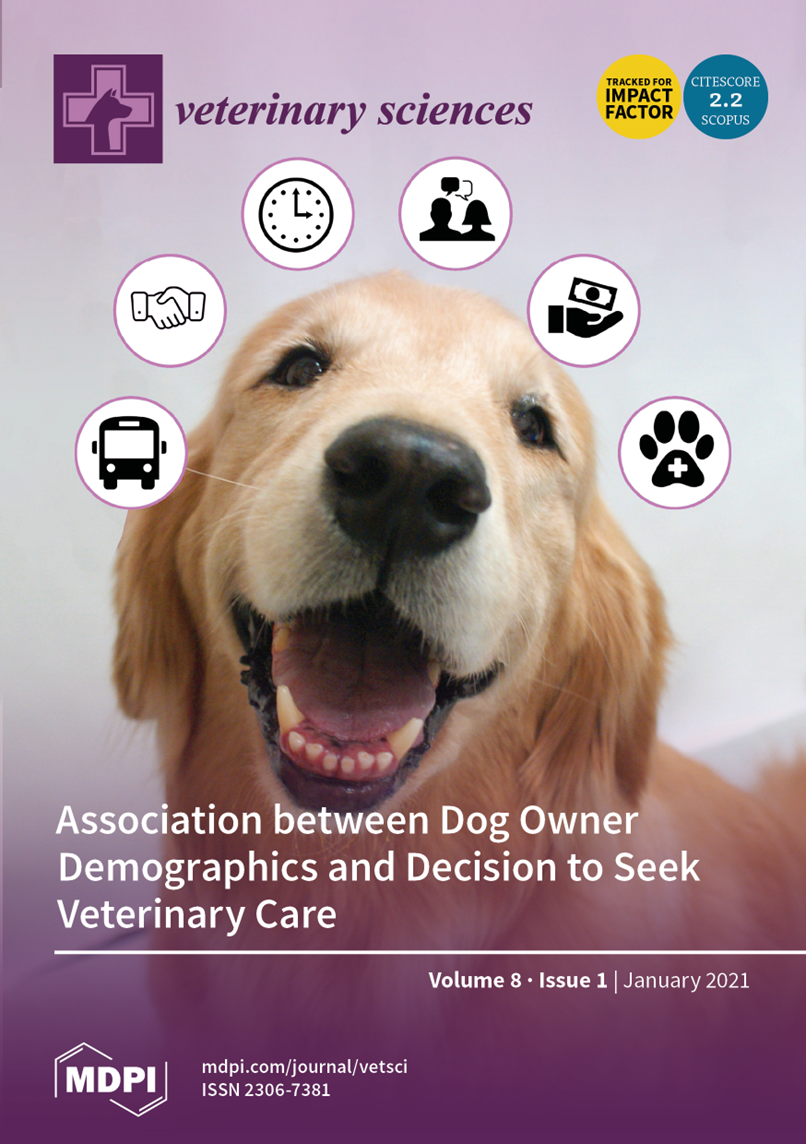 |
1. “Association between Dog Owner Demographics and Decision to Seek Veterinary Care” by Rachel M. Park, Margaret E. Gruen and Kenneth Royal Vet. Sci. 2021, 8(1), 7; https://doi.org/10.3390/vetsci8010007 Available online: https://www.mdpi.com/2306-7381/8/1/7 |
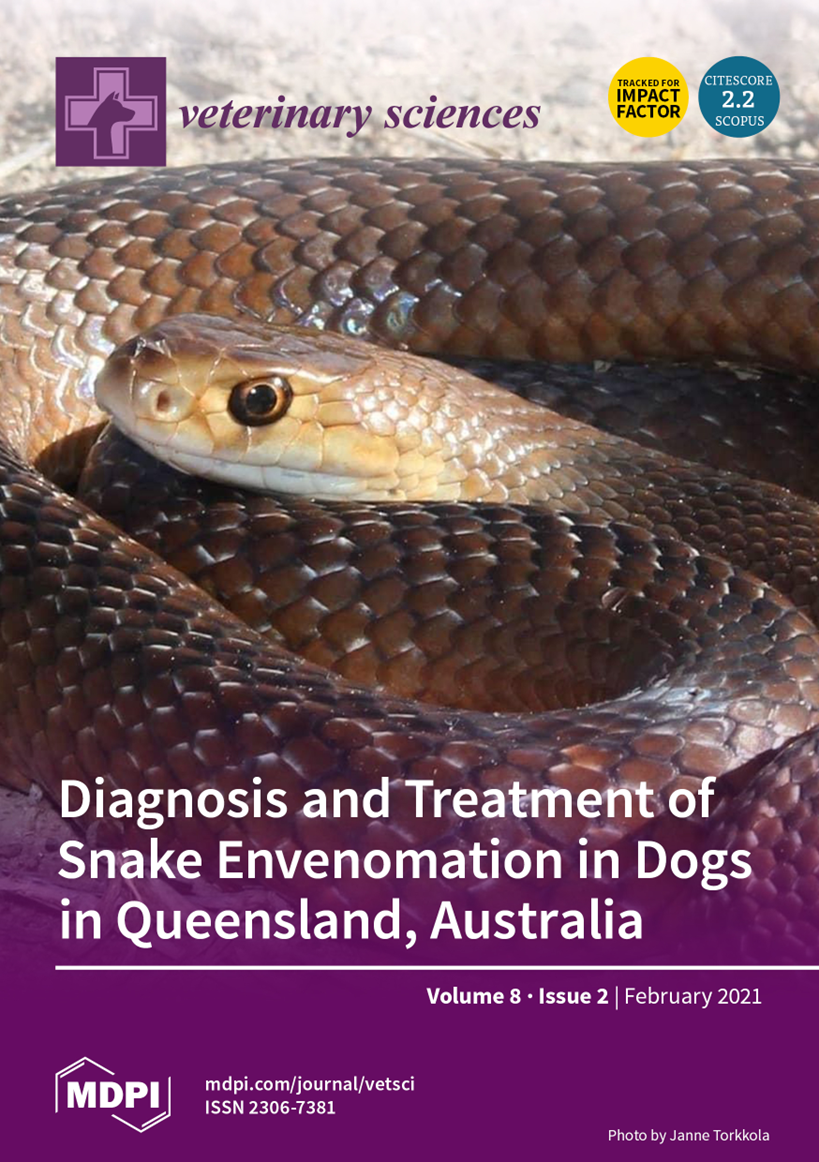 |
2. “Diagnosis and Treatment of Snake Envenomation in Dogs in Queensland, Australia” by Ludovica Valenza, Rachel Allavena, Mark Haworth, Jonathon Cochrane and Joerg Henning Vet. Sci. 2021, 8(2), 14; https://doi.org/10.3390/vetsci8020014 Available online: https://www.mdpi.com/2306-7381/8/2/14 |
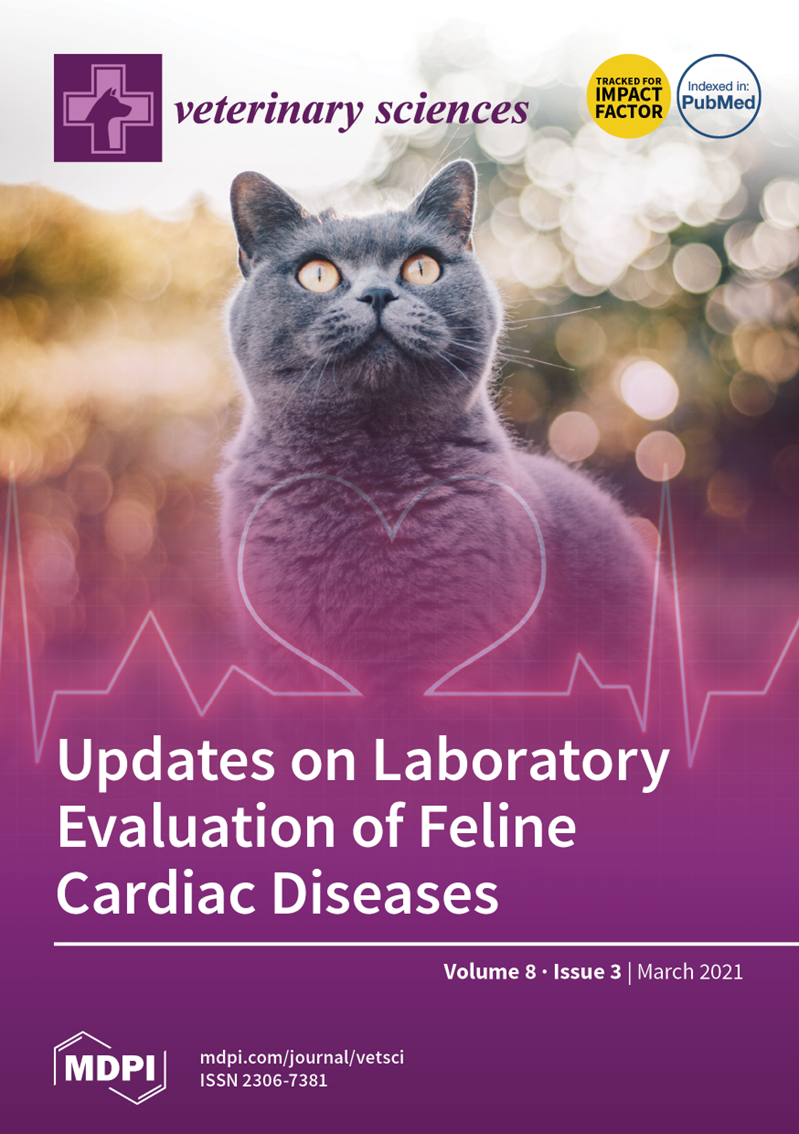 |
3. “Updates on Laboratory Evaluation of Feline Cardiac Diseases” by Alessandra Gavazza, Andrea Marchegiani, Lorenza Guerriero, Vanessa Turinelli, Andrea Spaterna, Sara Mangiaterra, Livio Galosi, Giacomo Rossi and Matteo Cerquetella Vet. Sci. 2021, 8(3), 41; https://doi.org/10.3390/vetsci8030041 Available online: https://www.mdpi.com/2306-7381/8/3/41 |
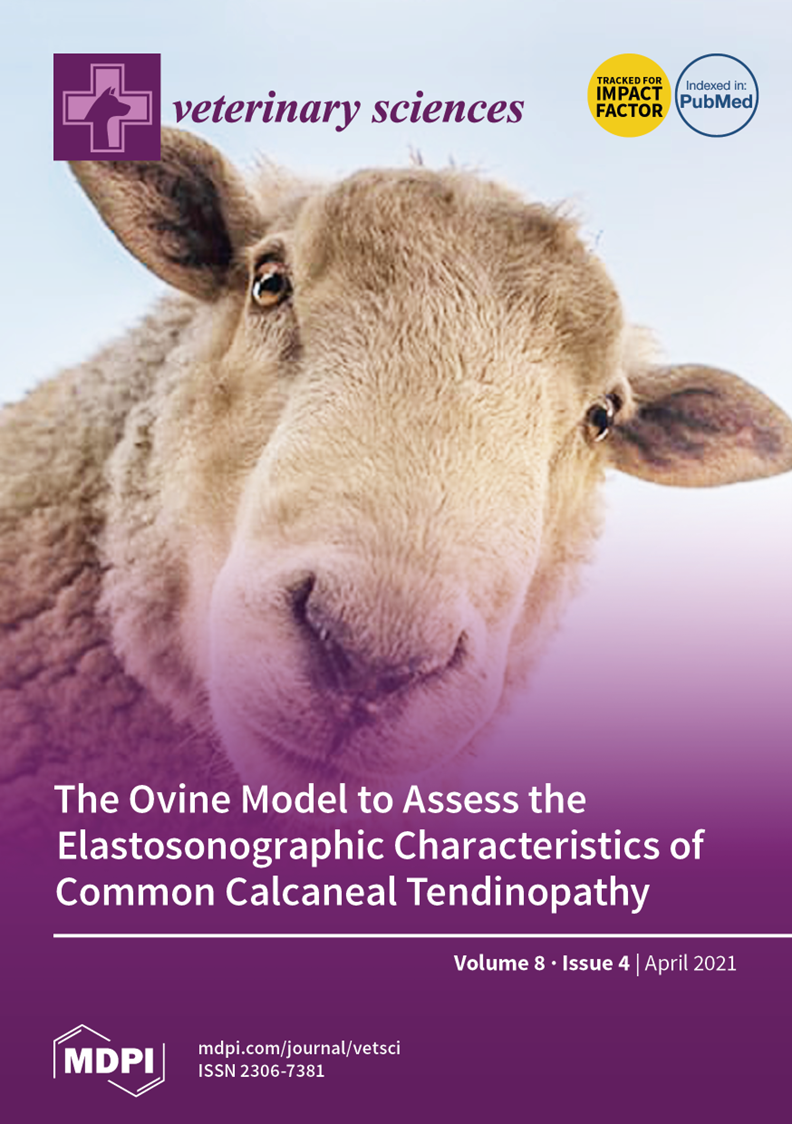 |
4. “Serial Ultrasonographic and Real-Time Elastosonographic Assessment of the Ovine Common Calcaneal Tendon, after an Experimentally Induced Tendinopathy” by Daniele Serrani, Antonella Volta, Franco Cingolani, Luca Pennasilico, Caterina Di Bella, Mattia Bonazzi, Alberto Salvaggio and Angela Palumbo Piccionello Vet. Sci. 2021, 8(4), 54; https://doi.org/10.3390/vetsci8040054 Available online: https://www.mdpi.com/2306-7381/8/4/54 |
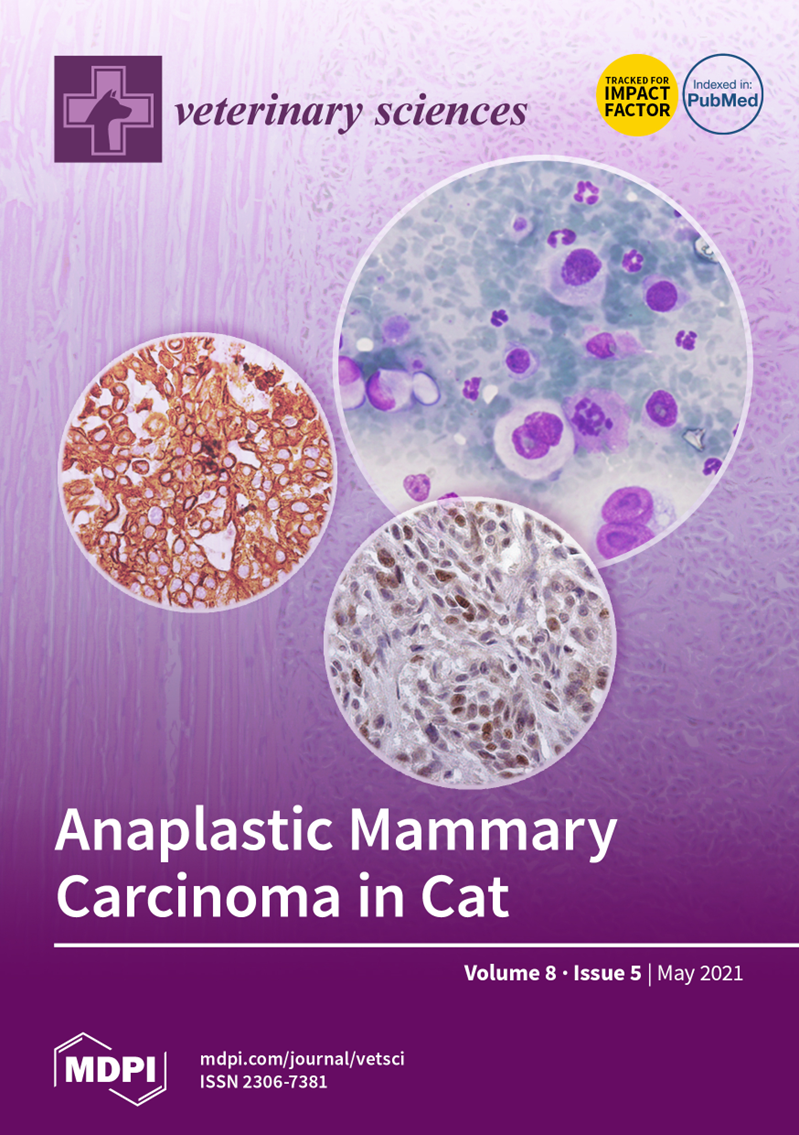 |
5. “Anaplastic Mammary Carcinoma in Cat” by Maria Soares, Jorge Correia, Catarina Nascimento and Fernando Ferreira Vet. Sci. 2021, 8(5), 77; https://doi.org/10.3390/vetsci8050077 Available online: https://www.mdpi.com/2306-7381/8/5/77 |
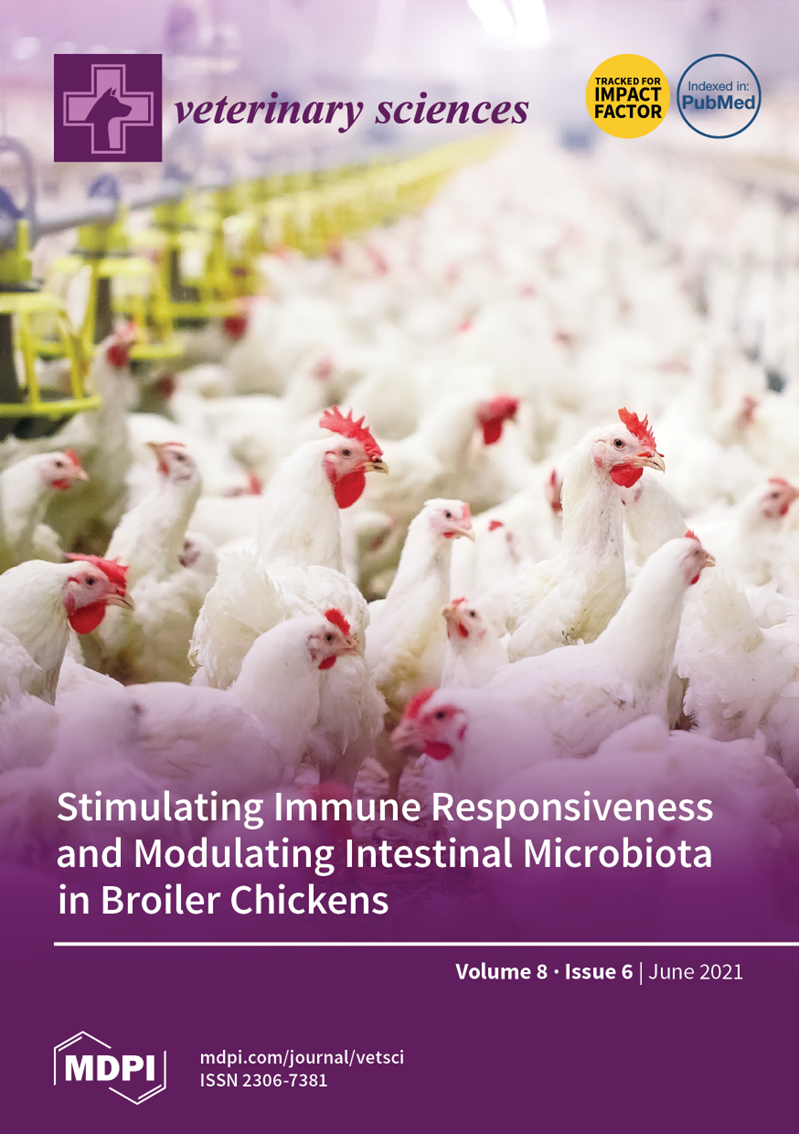 |
6. “Glucose Oligosaccharide and Long-Chain Glucomannan Feed Additives Induce Enhanced Activation of Intraepithelial NK Cells and Relative Abundance of Commensal Lactic Acid Bacteria in Broiler Chickens” by Nathalie Meijerink, Jean E. de Oliveira, Daphne A. van Haarlem, Guilherme Hosotani, David M. Lamot, J. Arjan Stegeman, Victor P. M. G. Rutten and Christine A. Jansen Vet. Sci. 2021, 8(6), 110; https://doi.org/10.3390/vetsci8060110 Available online: https://www.mdpi.com/2306-7381/8/6/110 |
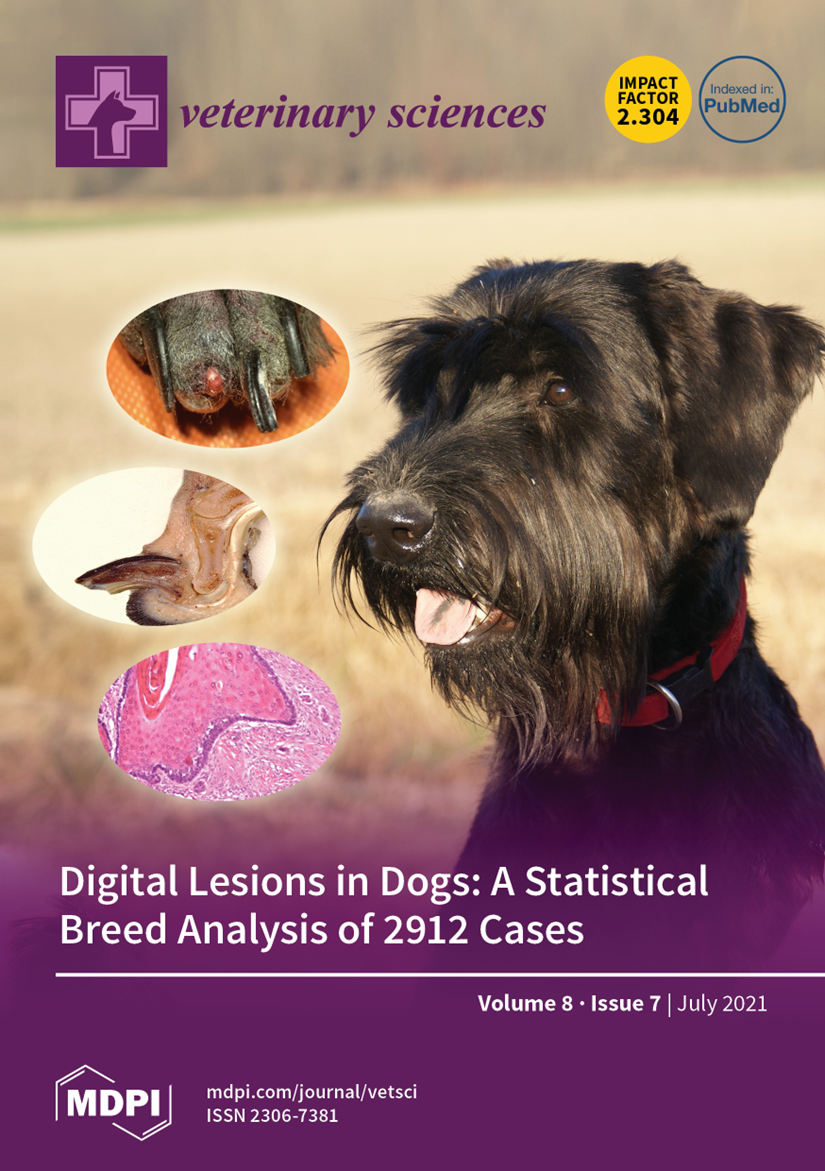 |
7. “Digital Lesions in Dogs: A Statistical Breed Analysis of 2912 Cases” by Julia Maria Grassinger, Andreas Floren, Tobias Müller, Argiñe Cerezo-Echevarria, Christoph Beitzinger, David Conrad, Katrin Törner, Marlies Staudacher and Heike Aupperle-Lellbach Vet. Sci. 2021, 8(7), 136; https://doi.org/10.3390/vetsci8070136 Available online: https://www.mdpi.com/2306-7381/8/7/136 |
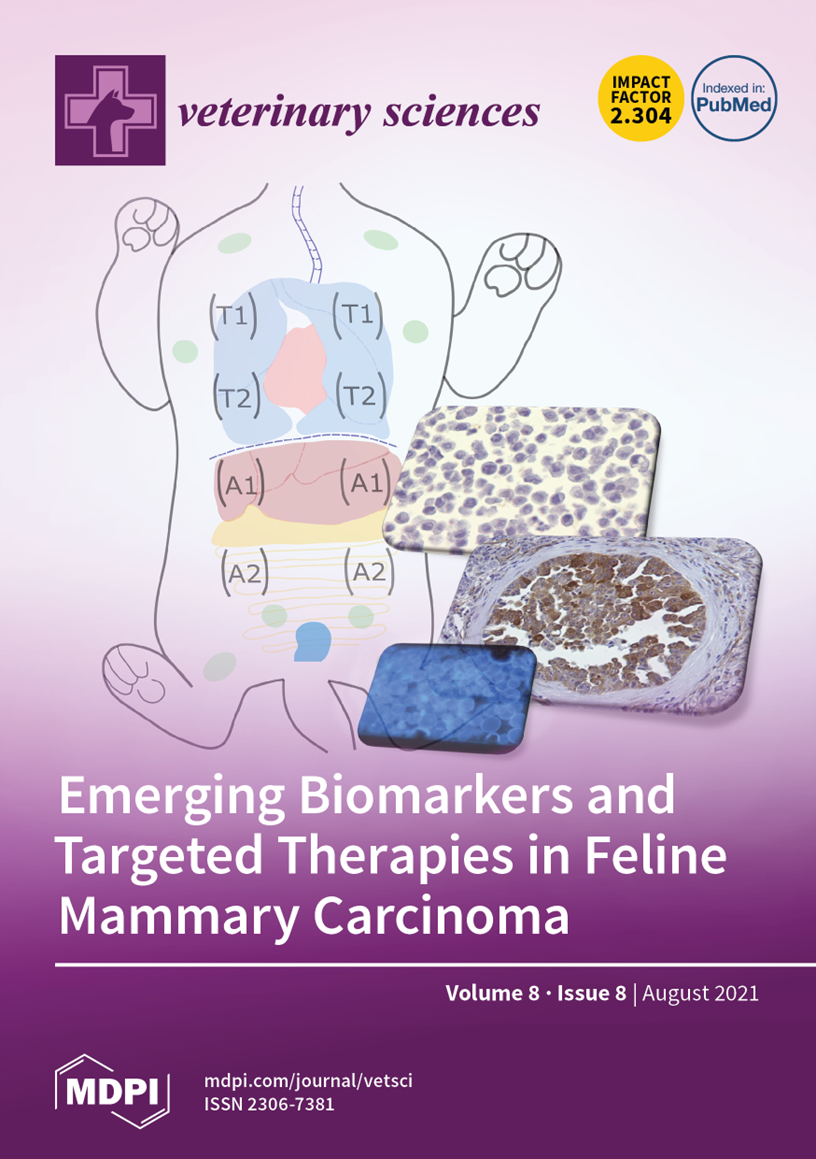 |
8. “Emerging Biomarkers and Targeted Therapies in Feline Mammary Carcinoma” by Andreia Gameiro, Ana Catarina Urbano and Fernando Ferreira Vet. Sci. 2021, 8(8), 164; https://doi.org/10.3390/vetsci8080164 Available online: https://www.mdpi.com/2306-7381/8/8/164 |
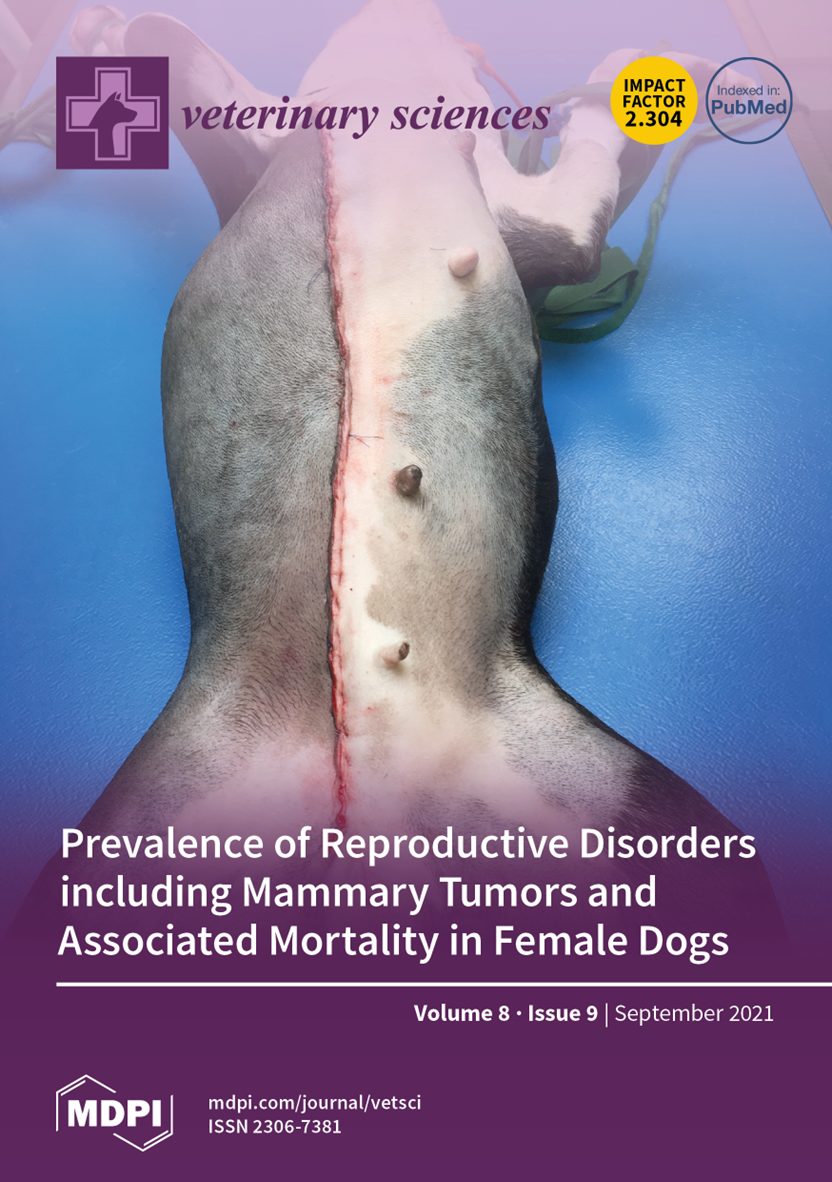 |
9. “Prevalence of Reproductive Disorders including Mammary Tumors and Associated Mortality in Female Dogs” by Claire Beaudu-Lange, Sylvain Larrat, Emmanuel Lange, Kevin Lecoq and Frédérique Nguyen Vet. Sci. 2021, 8(9), 184; https://doi.org/10.3390/vetsci8090184 Available online: https://www.mdpi.com/2306-7381/8/9/184 |
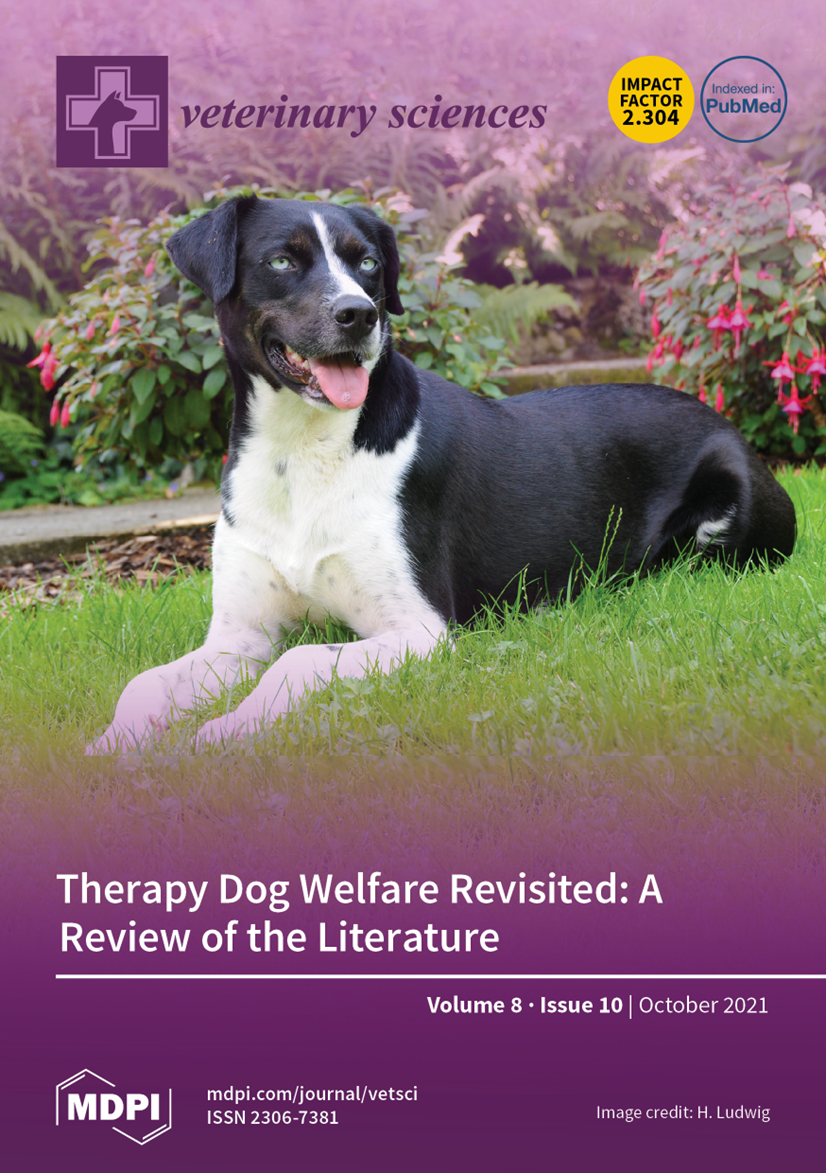 |
10. “Therapy Dog Welfare Revisited: A Review of the Literature” by Lisa Maria Glenk and Sandra Foltin Vet. Sci. 2021, 8(10), 226; https://doi.org/10.3390/vetsci8100226 Available online: https://www.mdpi.com/2306-7381/8/10/226 |
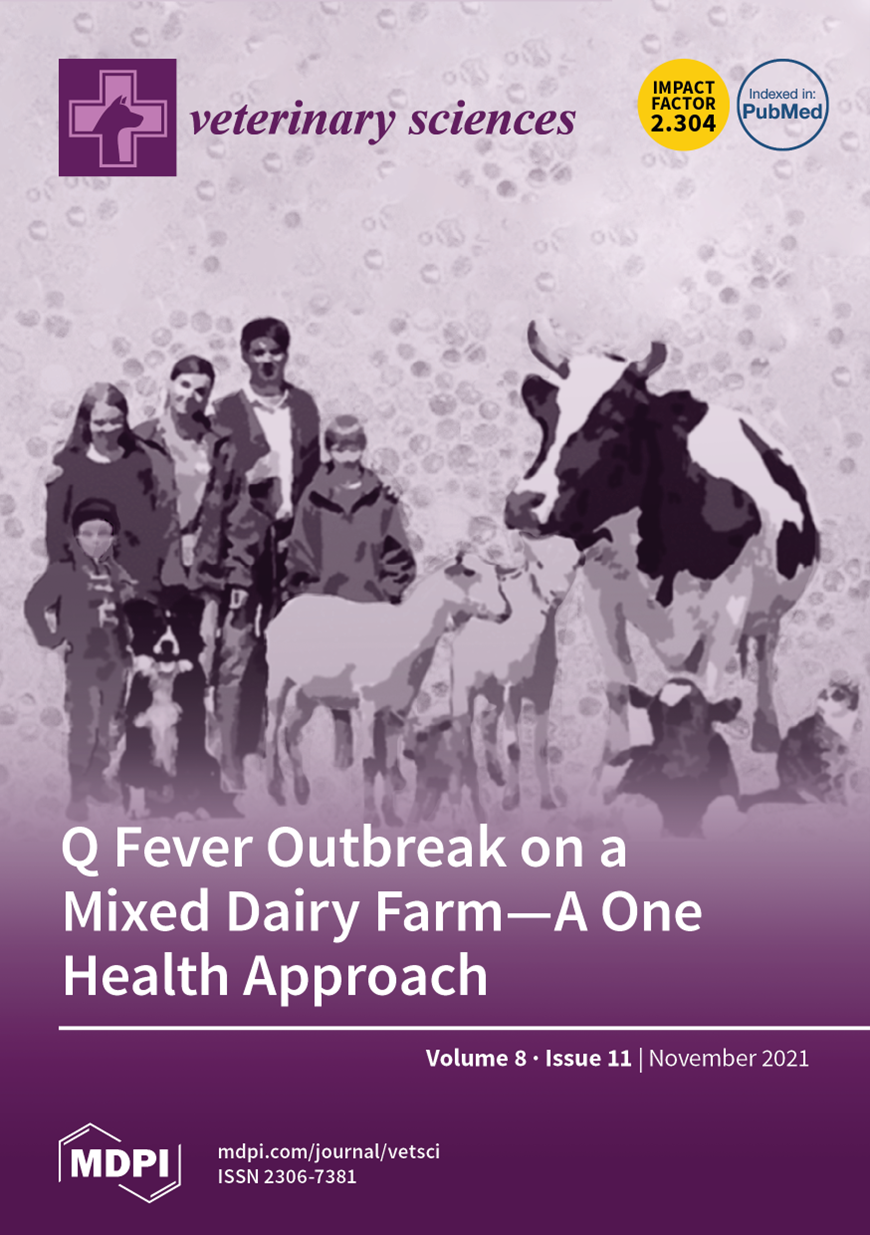 |
11. “Multispecies Q Fever Outbreak in a Mixed Dairy Goat and Cattle Farm Based on a New Bovine-Associated Genotype of Coxiella burnetii” by Benjamin U. Bauer, Michael R. Knittler, T. Louise Herms, Dimitrios Frangoulidis, Svea Matthiesen, Dennis Tappe, Martin Runge and Martin Ganter Vet. Sci. 2021, 8(11), 252; https://doi.org/10.3390/vetsci8110252 Available online: https://www.mdpi.com/2306-7381/8/11/252 |
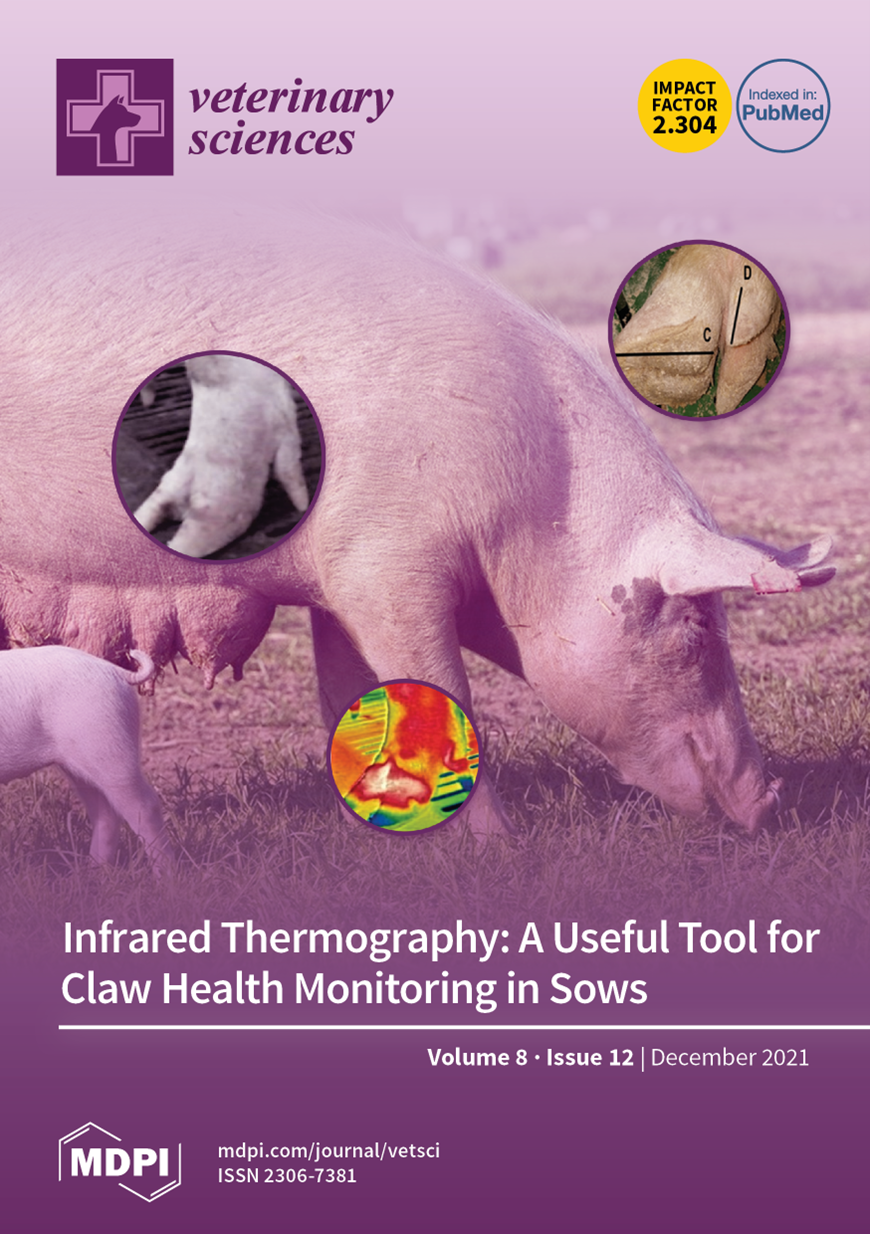 |
12. “Infrared Thermography Evaluation of Feet Temperature and Its Association with Claw Lengths and Anisodactylia in Purebred Sows of Three Greek Herds” by Fotios G. Kroustallas, Georgios A. Papadopoulos, Sofia Chalvatzi, Vasilis Skampardonis, Leonidas Leontides and Paschalis Fortomaris Vet. Sci. 2021, 8(12), 309; https://doi.org/10.3390/vetsci8120309 Available online: https://www.mdpi.com/2306-7381/8/12/309 |
15 June 2023
Veterinary Sciences | Most Viewed Papers in 2021 in the Section “Anatomy, Histology and Pathology”

The “Anatomy, Histology and Pathology” Section aims to publish articles on veterinary anatomy, veterinary histology, veterinary physiology, veterinary pathology, veterinary neuroanatomy and neurophysiology, veterinary forensic sciences, etc.
As all of the articles published in Veterinary Sciences (ISSN: 2306-7381) are of an open access format, you have free and unlimited access to the full text. We welcome you to read our most viewed papers published in 2021 listed below:
1. “Excitement-Induced Cutaneous Bleeding (Haematidrosis-like) in a Dog”
by Evi I. Sofou, Anna Gavra and Manolis N. Saridomichelakis
Vet. Sci. 2021, 8(12), 327; https://doi.org/10.3390/vetsci8120327.
Available online: https://www.mdpi.com/2306-7381/8/12/327.
2. “Phenotype of the Aging-Dependent Spontaneous Onset of Hearing Loss in DBA/2 Mice”
by Min-Soo Seo, Byeonghyeon Lee, Kyung-Ku Kang, Soo-Eun Sung, Joo-Hee Choi, Si-Joon Lee, Young-In Kim, Young-Suk Jung, Un-Kyung Kim and Kil Soo Kim
Vet. Sci. 2021, 8(3), 49; https://doi.org/10.3390/vetsci8030049.
Available online: https://www.mdpi.com/2306-7381/8/3/49.
3. “Changes in Serum Lipid Profiles among Canine Patients Suffering from Chronic Hepatitis”
by Sathidpak Nantasanti Assawarachan, Piyathip Chuchalermporn, Phudit Maneesaay and Naris Thengchaisri
Vet. Sci. 2021, 8(10), 221; https://doi.org/10.3390/vetsci8100221.
Available online: https://www.mdpi.com/2306-7381/8/10/221.
4. “Disseminated Toxoplasma gondii Infection in an Adult Osprey (Pandion haliaetus)”
by Xiaobo Wang, Charles T. Talbot, Ji-Hang Yin, Anwar A. Kalalah, Chengming Wang and Joseph C. Newton
Vet. Sci. 2022, 9(1), 5; https://doi.org/10.3390/vetsci9010005.
Available online: https://www.mdpi.com/2306-7381/9/1/5.
5. “Investigation on the Effect of Dose, Frequency and Duration of Allergen Exposure on Development of Staphylococcal Infections in a Chronic Model of Canine Atopic Dermatitis”
by Rosanna Marsella
Vet. Sci. 2022, 9(1), 8; https://doi.org/10.3390/vetsci9010008.
Available online: https://www.mdpi.com/2306-7381/9/1/8.
6. “Immunofluorescent Localization of Plakoglobin Is Altered in Endomyocardial Biopsy Samples from Dogs with Clinically Relevant Arrhythmogenic Right Ventricular Cardiomyopathy (ARVC)”
by Eva M. Oxford, Romain Pariaut, Massimiliano Tursi, Philip R. Fox and Roberto A. Santilli
Vet. Sci. 2021, 8(11), 248; https://doi.org/10.3390/vetsci8110248.
Available online: https://www.mdpi.com/2306-7381/8/11/248.
5 June 2023
Meet Us at the 42nd Annual Meeting of the American Society for Virology, 24–28 June 2023, Athens, Georgia, USA

MDPI journals will be attending the 42nd annual meeting of the American Society for Virology as an exhibitor. This meeting will be held in Athens, Georgia, USA from 24 to 28 June 2023.
The American Society for Virology (ASV) is a wonderful community that brings together virologists from all areas of the field. As a result, the annual meetings are rich in diverse scientific offerings and they can be quite large (sometimes over 1600 attendees). This conference is hosted by the University of Georgia and held at the Classic Center; the scientific program will include symposia, concurrent workshops, poster sessions, exhibits, and special events. Professional development activities and social events will be interspersed throughout the meeting.
The following MDPI journals will be represented:
- Biomedicines;
- Life;
- Viruses;
- Cells;
- Vaccines;
- Veterinary Sciences;
- Microorganisms;
- CIMB;
- Pathogens;
- TropicalMed;
- Zoonotic Diseases;
- COVID.
If you are attending this conference, please feel free to start a conversation with us. Our delegates look forward to meeting you in person and answering any questions you may have. For more information about the conference and our booth, please visit: https://asv.org/asv2023/.
15 May 2023
Meet Us at the 10th FEMS Congress of European Microbiologists, 9–13 July 2023, Hamburg, Germany
FEMS was established in 1974 and is now an active and diverse federation of 55 European learned societies that includes around 30,000 professionals who are committed to advancing microbiology for the benefit of society. Located in 38 European countries, around half of these professionals are early career researchers, and the remainder include industry scientists, established academics, educators and campaigners. The 10th FEMS Congress of European Microbiologists will take place in Hamburg, Germany, from 9 to 13 July 2023. This event is dedicated to showcasing the latest developments in microbiology and to connecting microbiologists from all over the world.
Main topics:
- Environmental Microbiology & Ecology;
- Biotechnology & Synthetic Microbiology;
- Food Microbiology;
- Infection Biology & Pathogens;
- Infectious Diseases;
- Taxonomy & Systematics;
- Genetics & Genomics;
- Virology;
- Microbiology Education & Profession;
- Molecular Microbiology & Biochemistry.
The following MDPI journals will be represented:
- Microorganisms;
- Veterinary Sciences;
- Foods;
- MPs;
- CIMB;
- Diversity;
- Biology;
- Fermentation;
- Microbiology Research;
- JoF;
- Pathogens;
- Antibiotics;
- Biomolecules.
If you are attending this conference, please feel free to start an online conversation with us. Our delegates look forward to meeting you at booth #B18 in person and answering any questions you may have. For more information about the conference and our virtual booth, please visit the following link: https://www.fems2023.org/.
31 March 2023
Veterinary Sciences | Seeking Cooperation with Academic Conferences
Veterinary Sciences (ISSN: 2306-7381) received its Impact Factor of 2.518 in 2022 and is now published monthly. The journal covers almost all topics related to animal health and veterinary medicine.
Veterinary Sciences is an international and interdisciplinary scholarly open access journal. It publishes original research articles, reviews, communications, and short notes that are relevant to any field of veterinary sciences, including prevention, diagnosis and treatment of disease, and disorder and injury in animals. There is no restriction on the length of the papers. The journal aims to encourage scientists to publish their experimental and theoretical research in as much detail as possible. Full experimental details and/or methods of study must be provided for research articles. Articles submitted that involve subjecting animals to unnecessary pain or suffering will not be accepted, and all articles must be submitted with the necessary ethical approval.
In order to support the scientific community and contribute to the faster distribution of important scientific research, Veterinary Sciences has cooperated with various academic conferences and is now seeking cooperation with additional academic conferences. The journal is open to a diverse range of collaborations, such as media partnerships, awards, exhibitions, and publications.
The scope of Veterinary Sciences includes but is not limited to the following:
- Publishing research related to a broad spectrum of biomedical research in the field of veterinary sciences, from basic to applied and from translational to clinical;
- Covering all aspects of veterinary internal medicine research on the occurrence, development, prognosis, and prevention of animal non-infectious diseases;
- Contributing to the advancement of reproduction in animals, including the physiology and pathology of animal reproductive systems and the clinical advances of veterinary obstetrics, gynecology, andrology, and assisted reproductive techniques;
- Inciting research on the diagnosis, pathogenicity, infection mechanism, epidemiology, and drug development of pathogenic microorganisms (bacteria, viruses, parasites, etc.) associated with animal diseases in the laboratory, as well as their production, clinical use, etc.
We welcome consultations with any conferences related to veterinary medicine and animal health. If you are interested in collaborating with us, please contact us at vetsci@mdpi.com.
31 March 2023
Meet Us at the 8th European Congress of Virology 2023, 4–7 May 2023, Gdańsk, Poland

Conference: 8th European Congress of Virology 2023
Date: 4–7 May 2023
Location: Gdańsk, Poland
MDPI will be attending the 8th European Congress of Virology 2023 (ECV 2023) as an exhibitor, and we welcome researchers from different backgrounds to visit and share their latest ideas with us.
This conference is organized by the European Society for Virology. ECV 2023 will be a great opportunity for European virologists representing various fields of research to meet, present their results, and discuss all the developments in virology that have taken place during this unusual time. It will also be a great opportunity to meet friends, renew old acquaintances, and establish new collaborations. Although coronavirus studies will undoubtedly be one of the leading subjects at ECV 2023, it is important to have all research areas represented, including basic, clinical, veterinary, and plant virology.
The following MDPI journals will be represented:
If you are planning to attend this conference, please do not hesitate to start an online conversation with us. Our delegates look forward to meeting you in person and answering any questions that you may have. For more information about the conference, please visit the following website: https://www.eusv-congress.eu/.
13 March 2023
MDPI’s Newly Launched Journals in December 2022
As a leading open access publisher, MDPI provides scholars with a high-quality and rich academic exchange platform by continuously expanding into new and exciting research areas.
In December 2022, MDPI launched five new journals, covering multiple subjects such as life sciences, biology, medicine and pharmacology, social sciences and humanities. These new journals are being edited by established scholars across the world.
|
Journal |
Founding Editor-in-Chief |
Journal Topics (Selected) |
|
Prof. Dr. Fabio Gresta, University of Messina, Italy| Editorial | view inaugural issue |
grass/forage/turf production; grassland management; pasture monitoring; grazing and livestock; grass agro-ecosystems| view journal scope | submit an article |
|
|
Prof. Dr. Christos G. Athanassiou, University of Thessaly, Greece| Editorial | view inaugural issue |
pesticides; fungicides; herbicides; fertilizers; soil conditioners| view journal scope | submit an article |
|
|
Prof. Dr. Stephen H. Safe, Texas A&M University, USA| Editorial | view inaugural issue |
receptor structure; receptor function; receptor signaling; receptor expression and regulation; receptor interactions with drugs| view journal scope | submit an article |
|
|
Dr. Jean Jacques Vanden Eynde, University of Mons-UMONS, Belgium| Editorial | view inaugural issue |
drug discovery; medicinal chemistry; preclinical and clinical research; marketed drugs; intellectual property and regulatory affairs| view journal scope | submit an article |
|
|
Prof. Dr. Heather Kanuka, University of Alberta, Canada| Editorial | view inaugural issue |
higher education; tertiary education; policy and practice in higher education; educational leadership in higher education; educational administration and management in higher education| view journal scope | submit an article |
If you are interested in creating more open access journals with us to publish cutting-edge research, please send your journal proposal application to newjournal-committee@mdpi.com.




